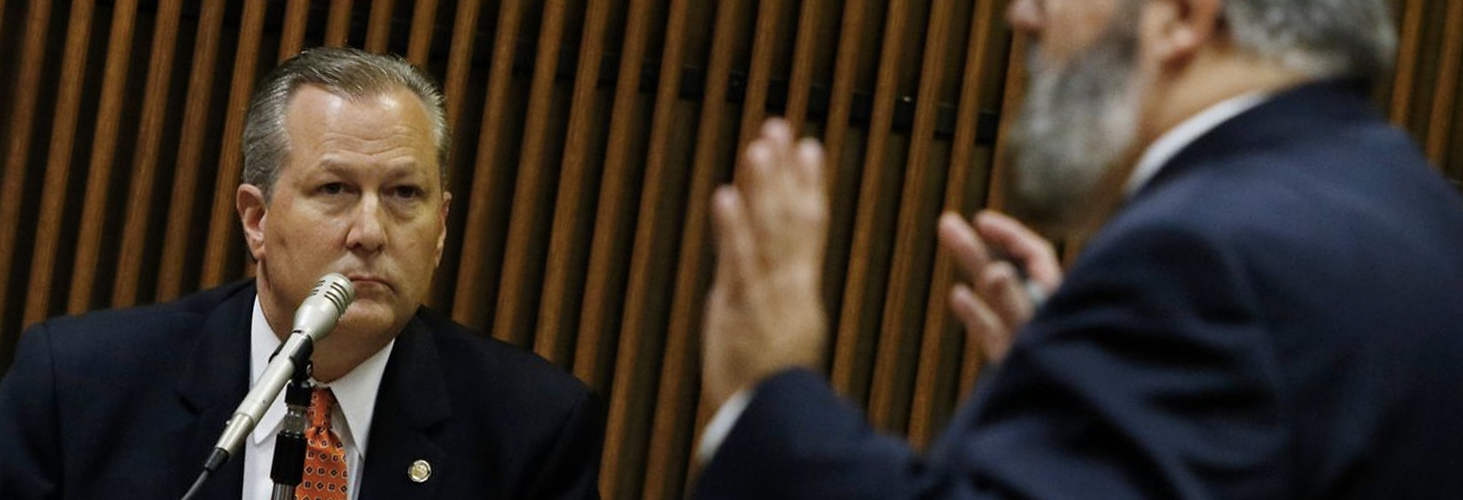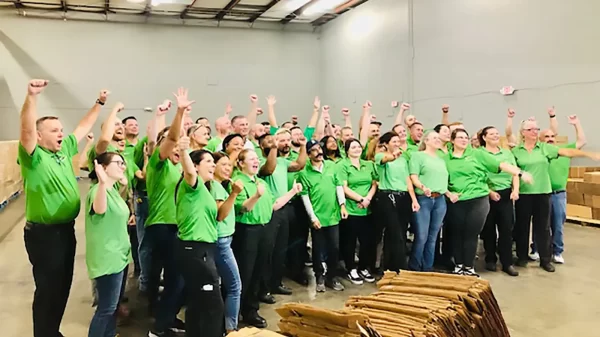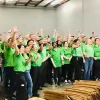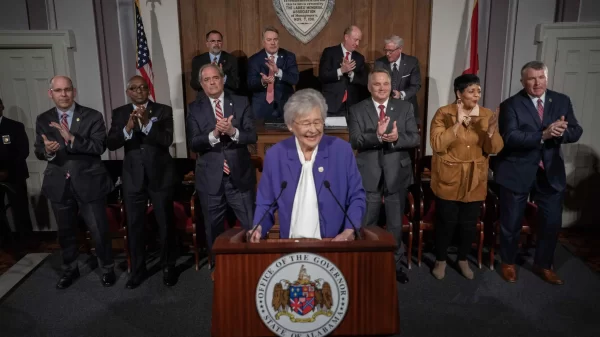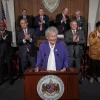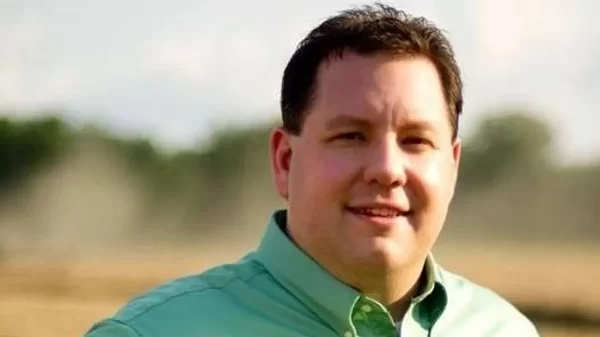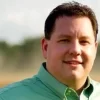By Bill Britt
Alabama Political Reporter
OPELIKA—The State of Alabama v. Michael G. Hubbard, day twelve, marked the beginning of the end for the criminal trial that has been years in the making. It is tempting to use a multitude of adjectives to describe the most surreal day to date.
Suffice it to say, it was dramatic and bizarre.
The trial began with Lead Prosecutor, Matt Hart, cross examining Hubbard, using a proffer Hubbard signed in March, 2014. The Prosecution was able to impeach Hubbard on several points in his testimony before the court. During the trial, evidence showed Josh Blades had initiated the calls to help Bobby Abrams’ company with a much needed patent, and it was Blades who did most of the work…on State time. However, in 2014, Hubbard told Hart and others in a sworn statement, that only he had made calls concerning the patent.
In his proffer, Hubbard stated that he knew about the language that was inserted in the Medicaid portion of the General Fund Budget, that benefited his client APCI. But, in court this week, he said he didn’t know anything about it.
During his testimony over the last few days, Hubbard said that The Howe Group had received 5 percent of the money that came from the ALGOP in 2010, and that Auburn Network received 10 percent. But, in March 2014, Hubbard stated that neither he nor Howe took any commission, so that the ALGOP would have 15 percent more to spend on advertising.
Hart, next introduced into evidence, an email from Hubbard to Michael Mitchell from Publix Super Markets, seeking an appointment to talk about selling them Capitol Cups. Hubbard was shown the signature line that had his title, Speaker of the House, district and district address. Hubbard said that his secretary had put it there and that he has since had it changed. Hubbard said Mitchell was an old college friend, and that the two men remained close over the years. Hart then read an email from Mitchell to one of his colleagues saying, that the Speaker of the House of Alabama wanted to meet with them about selling them some cups. Hubbard said it was a friend helping a friend.
Hart then turned it over to David McKnight for redirect, who walked Hubbard through the general paces of refuting everything that Hart had asked him. After McKnight”s redirect, Hart asked for a short break which Judge Jacob Walker, III, granted.
After the break, Hart said he had one more question for Hubbard.
So Michael Mitchell was your good friend?”
Hubbard repeated that he was a good friend, and a good man.
Hart asked, “And he died?”
Hubbard said, “yes.”
Hart returned to his desk, sat down, looked at Hubbard and said, “That’s interesting, we just spoke to him a few days ago and he was fine.”
Hubbard came back with, “I must have mistaken him for someone else.”
To which Hart replied, “How good of friends were you?”
After the Defense rested, Hart called only one rebuttal witness, Senate President Pro Tem Del Marsh.
During earlier testimony, Hubbard and former Gov. Bob Riley said that they, along with Marsh, made the decision to use Craftmaster Printers. Marsh was asked if he authorized the use of Craftmaster Printers in 2010. He replied that he did not personally authorize it. Next he was asked, “Were you ever in a meeting with Mike Hubbard and Bob Riley, where it was decided to use Craftmaster Printers?” Marsh replied, “It has been 8 years ago, but I can’t recall any such meeting.”
Baxley cross examined Marsh about the quality of the work and the pricing. Marsh answered that the quality was good, and the prices were competitive.
The Judge then gave the jury a four hour break. There was some legal housekeeping done during that period, where the defense, once again argued for the charges to be dismissed. Judge Walker denied the request. There was also a lengthy debate over how the jury would be charged. In other words, what instructions would they be given.
When the proceedings continued at 2:30 pm, Deputy Attorney General, Michael Duffy, conducted the first closing argument for the Prosecution. His presentation was concise, thorough and sought to separate what was the law, what were the actual charges, what was and what was not important from what they heard during the hearing phase. Using a well-crafted PowerPoint presentation, he illustrated each point, and the charges against Hubbard. Thus, Duffy concluded his one hour and fifteen minute presentation.
At one point, when Duffy was discussing Hubbard’s contract with Edgenuity he said, you saw an exhibit that showed a check with “for lobbying services” in the the memo line of the check. “What you didn’t see was this…that there were sixteen checks with the lobbying services on the check.” On the big screen, a graphic with the checks lined up, giving emphasis to just how many there were.
He also, at one point during his presentation, reminded the jurors of Josh Blades’ testimony, in which he described Hubbard telling him he had $100,000 reasons to want to get the patent for Bobby Abrams. He reminded the jurors that Blades said that it made him uncomfortable, because he thought the Speaker was talking about money.
Hubbard and his criminal attorney had looked for several ways to explain the 100,000. Duffy had his own. Duffy then introduced an email between Hubbard and Blades about the Abrams patent, dated August 1, 2013. A calculation by the Prosecution of the checks that Hubbard had received from Capitol Cups as of July 2013, was exactly $100,000. On the screen he showed that in fact that Hubbard had $100,000 reasons.
During closing arguments, Duffy showed what Hubbard had to loose if he didn’t raise the $1.5 million from investors. As it turned out, Hubbard was personally liable for around $850,000, that was about to be foreclosed on by the banks and the Federal Government.
Duffy then asked what Hubbard wanted. He then displayed on the screen an email, between Hubbard and Riley, where Hubbard said he wanted to make about $2 million. A graphic showing the total calculation of checks from clients and investors totaled over $2.3 million was startling. Duffy stated, “He wanted to make $2 million and that is what he did.” In the end, he reminded the jurors that it was about the law, and that they must find Hubbard guilty.
Hubbard’s attorney, Lance Bell, gave the defense’s first closing argument. A former US Attorney, and a retired Poly/Psych professor both said it was the most bizarre and amateurish close they had ever witnessed. Bell accused former ethics director, Jim Sumner, of being in the government’s pocket, meaning the prosecution. The Judge instructed the jury that Bell had made a false statement and should be disregarded. He also made statements about investor, Jim Holbrooke, which should call for another cure from the Judge saying Bell was out of bounds.
Bell’s close may be summed-up by his own words: “They don’t have nothing.”








































